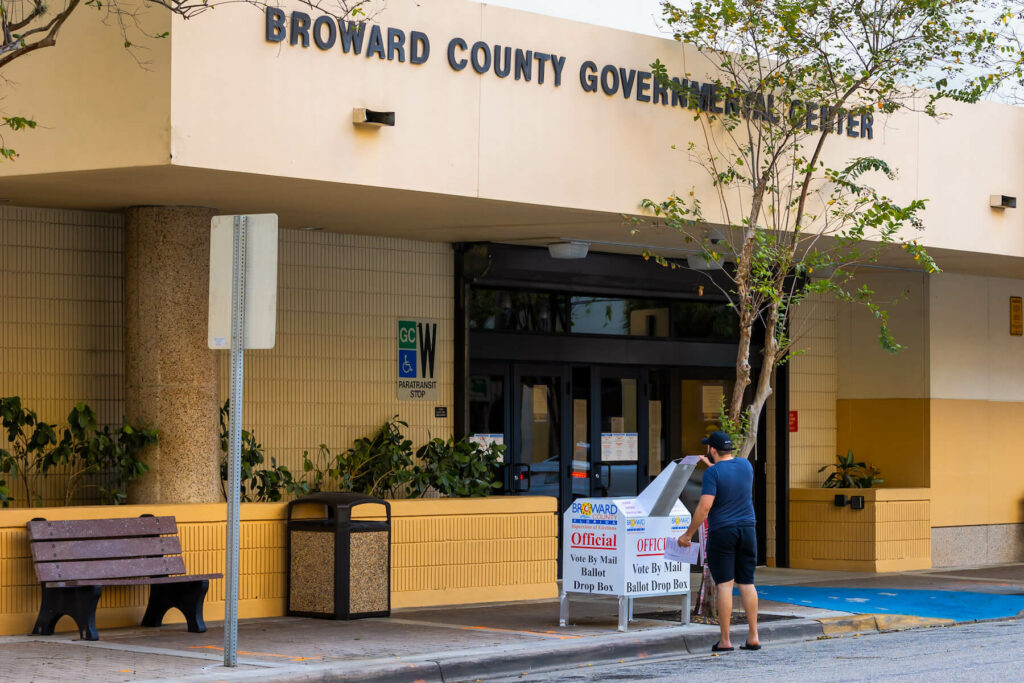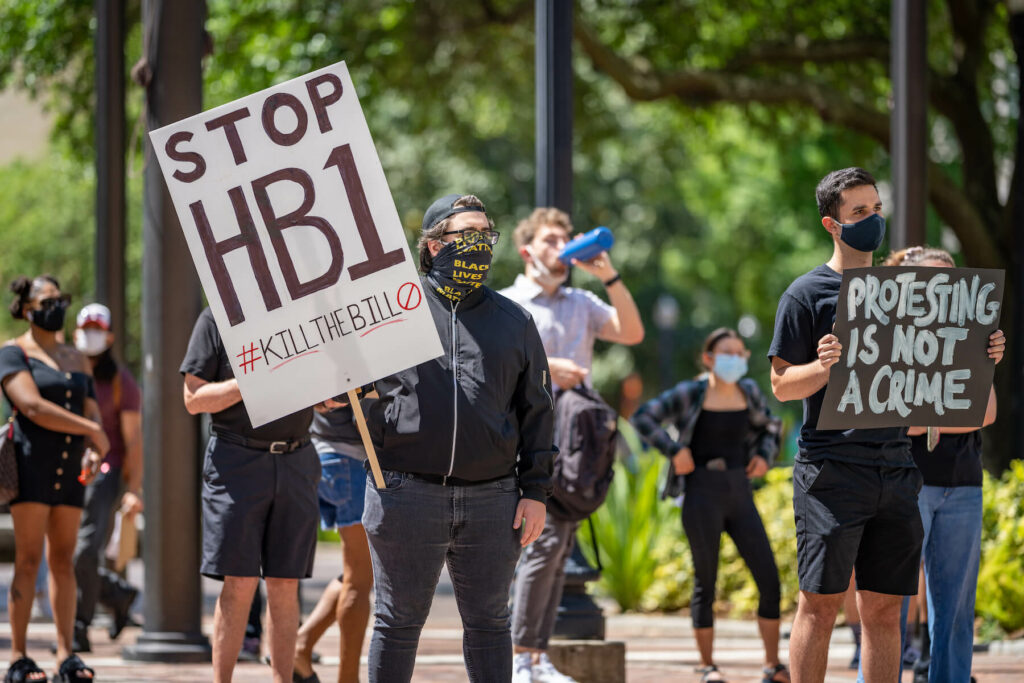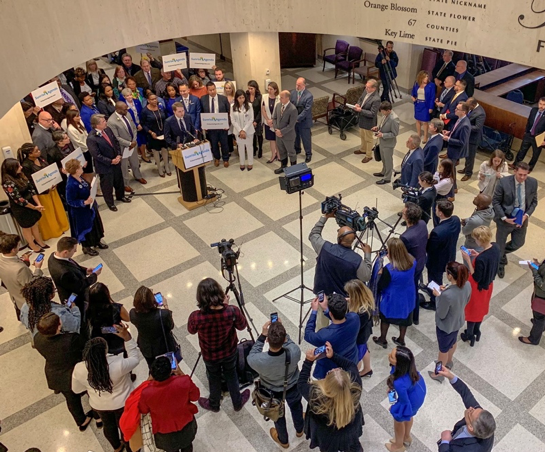Q&A: How New Laws Are Changing Voting in Florida
This Q&A is excerpted from a State Innovation Exchange telephone townhall featuring Florida State Representatives Tracie Davis and Rep. Geraldine Thompson, and Florida State Senator Shevrin Jones.
Answers have been edited for length and clarity.
What voting changes passed this legislative session? How will those changes impact Floridians?
Rep. Geraldine Thompson: One of the most significant things in Senate Bill 90 is the restriction on voting drop boxes. In 2020, we saw drop boxes used in enormous numbers. Now, drop boxes can only be available when the Supervisor of Elections office is open or when early voting sites are open. So, people who work 9-5 will have difficulty accessing the drop boxes.
Another new restriction is that only family members or someone who lives at the same address can drop your ballot off. This will make it especially difficult for people who have no transportation or have medical conditions and need someone else to take their ballot to the polls.
Rep. Tracie Davis: This new law also implements a fine of $25,000 on Supervisors of Election offices if they don't comply with the new dropbox provisions. So if they are being fined $25,000, a supervisor may suddenly not want to use as many drop boxes, or they won't use the drop boxes at all.
I have a ninety-year-old mother who gets an absentee ballot sent to her. Should I request a ballot for her for the upcoming 2022 elections? And do I need to submit a copy of her I.D. to do that?
Rep. Tracie Davis: Yes, you probably want to call to request that ballot for your mother. But you don't need to show her I.D. at the time. When you request the ballot over the phone or by e-mail, you have to give her date of birth; driver's license or I.D. number; or the last four digits of her social security number.
If you go inside to pick up the absentee ballot, you're going to have to have written authorization from your mom. But that's to pick up that ballot—not to request it.
Rep. Geraldine Thompson: One victory was, they did grandfather-in people who already submitted vote-by-mail requests.
But just to be on the safe side, as Representative Davis said, I would request it.
But after the election in 2022, you're going to have to request the vote by mail ballot each year. So it's no longer going to be good for two general elections, as it was in the past. It's better to be safe than sorry.
What recourse do we have concerning the voter suppression law? And are organizations taking this case to court?
Rep. Geraldine Thompson: There has been litigation filed. But while the litigation goes through the courts, you're bound by this law. So we need to prepare for it.
Nonprofit groups are preparing to transport people to drop their ballots at either the supervisor's office or the drop boxes. And they are also going to provide food and water to voters. Voter education will also be a big part of how we counteract the laws that have been put in place.

Are there new I.D. requirements when returning ballots through drop boxes or the post office?
Rep. Geraldine Thompson: One of the victories with this legislation is that we were able to get a part removed so that you don't have to show a photo I.D. at drop boxes. There are no I.D. requirements at the post office either.
But please be mindful, the new law does make it a criminal offense to possess more than two ballots, including your own. If you are helping someone else, the best thing to do is take an individual to the dropbox with you and allow that person to drop their vote-by-mail ballot.
And please make sure your signature is updated. The signature on your ballot's envelope will be compared to the signature you provided when you initially registered to vote or last updated your signature.
As we age, our hands are not as steady, or maybe we have arthritis. You want to make sure you have a current signature on file.
Can you explain the recent anti-protesting bill that the governor signed into law?
Sen. Shevrin Jones: At the beginning of September, the governor made HB1, the anti-protesting bill, a priority instead of COVID. This was during the time of the George Floyd demonstrations and Justice for Brianna Taylor.
The bill basically criminalizes protesting. For example, suppose Rep. Davis, Rep. Thompson, and I get together on the side of the road holding up signs. A police officer can deem that to be "mob intimidation," which is not defined, or feel that we are "rioting," which is also not defined. Then the three of us will go to jail and not be released until we see a judge.
And if convicted, we would be convicted of a felony. As you may know, in the state of Florida, a felony restricts me from voting, makes it hard for me to get employment, and hard to get a loan. But let me be clear, the fear they are trying to instill with this law should not scare us and stop us from going out to protest injustice.

With the new law making many things criminal offenses, voting can be fearful to individuals like me. What do we do?
Sen. Shevrin Jones: That's exactly what they want us to do; they want us to be fearful. But we can't allow that, and that's why we have to organize. We need groups like churches to get communities together to have these conversations, to inform the community of these changes.
We don't have time to be fearful. We have to act right now.
Rep. Tracie Davis: That's why we're having this conversation. We cannot let this law make us fearful. We need to continue to educate our voters, educate ourselves, and educate each other. Churches are having conversations like this. Legislators around the state, including myself, will be coming to talk to our constituents.
We will make it happen. We will continue to register, and we will continue to get people to the polls to vote. Do not be fearful. We have been here before. And we will make it through just like we did before.
If I get a group of 180 people to my church at Miami Garden, can I get a representative to come out and speak?
Sen. Shevrin Jones: Yes, e-mail me with the name of the church and your information, and we'll set it up.
